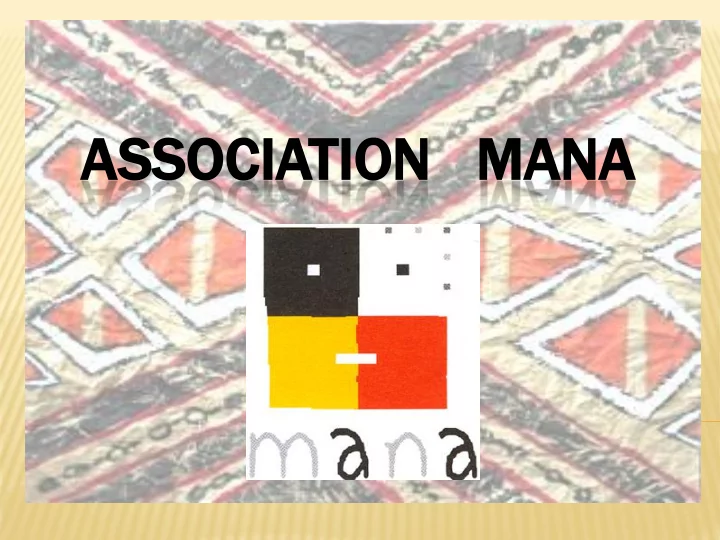

ASSOCIA OCIATION TION MA MANA NA
MANA MANA association was funded in 1998 in Bordeaux. MANA is a polysemous Polynesian term studied by Mauss, who indicates "the power and the chance of any successful, human or cosmic, magic or religious action" and that we translate by "symbolic efficiency"
MANA association was funded by Claire Mestre, psychiatrist and anthropologist, and Alenka Krivsky, engineer and treasurer. With a aim to propose a welcome and therapeutic care more adapted to the migrant populations, refugees and asylum seekers, the Mana association work was based in the cross- cultural clinic and ethnopsychiatry.
George Devereux funded the ethnopsychiatry, he develops the complementarity method: the use of a double speech to study a fact concerning the human being: It is a double analysis within the framework of the ethnology and within the framework of the psychology. For him, culture and psyche are two facets of the same reality. The culture is a therapeutic lever to reach the representation of the patient and from this representation we look for a universal symptom. Tobie Nathan created the first transcultural consultation in the Hospital Avicenne en Paris For Claire Mestre, the cross-cultural clinic allows the sharing between the patient and the therapist, both of different culture, of a set of cultural representations which allows the therapeutic alliance. For her the cross-cultural relation also has to be build from social and political context.
Today, the Mana association is constituted by 24 employees and three working areas. Mana's actions concern approximately 1000 people at year and is a member of the Network RESEDA (French-speaking network of care and support for the exiles victim of torture and political violence).
1. CROSS OSS-CUL CULTU TURA RAL L CA CARE E AND RES ESEAR EARCH CH AREA EA This area, managed by Dr Claire Mestre, gathers activities of care, prevention, training and research. The therapeutic approach of this area is based on the cross- cultural therapeutic consultation. Consultations are provided in a group with a main therapist, co-therapists, generally psychologists and anthropologist, and always with interpreters. It is a clinic of the exile and the trauma that addresses to migrant populations in great difficulty : Families, women with children, men, isolated minors and survivors of tortures.
The consultations are provided in a hospital and in a maternity of Bordeaux. Services are free. The cross-cultural care and research area is composed by about twenty professionals, particular psychologists formed in the cross- cultural therapy, in the parenthood, in the care of PTSD and the torture, and anthropologists specialized in the perinatal period in migration, in the violence; a psychiatrist, a psychomotor therapist and one painter art-therapist.
This area provides workshop : workshop for perinatal period: about the maternity in the exile o and practices of mothering workshops about the relation between trauma and pain which o address patients having PTSD and have suffered torture Workshops with cultural and artistic mediation o The cross-cultural care area also organizes trainings: Two seminaries of study all the year o Interprofessional meetings for a work in network around the o parenthood and a maternity in exile and the foreign isolated minors. Partnership with the University of Bordeaux in the university o diploma « medicine and cross-cultural care »
2- SCHOOL HOOL OF THE E WOMEN EN AREA EA: : PREV EVEN ENTION TION AND PROMO ROMOTION TION OF THE E HEA EALTH The School of the Women develops activities for the prevention and the promotion of the health to the populations of the migrants, and mainly the women who live in the suburb The working approach of this area is based on the intercultural and local work. The team is formed by five employees: a coordinator, a secretary, a social and a health mediator, of a mediator interprets in Turkish and an art therapist.
The cultural mediator in Turkish language is a community agent , that is a person who grown in the community and in the suburb which allows to translate in the literal sense of prevention messages and legal frameworks, but translate also at the level of the representations, between institutions and professionals of the sanitary and social work, and Turkish speaker people. The School of the women develops actions with two main objectives: Increase the access to the right to the information and to the care through to the mediation and the interpreting between public beneficiary and sanitary, social and school institutions; Mediation intercultural is physical and administrative supports provide by both mediators
o Develop prevention initiatives with the most distant public (people in precarious situation, no French speaker people migrants, vulnerable people, etc. …). Workshops of learning of the bike and the workshops socio- • linguistic. Workshops dance-health for the women and the art therapy for the old women provide by art therapist. Meetings with the women of the district, called • « causeries », are also organized once a month around a different subject but always in connection with a theme of the health. And in 2016, the School of the women developed a working • theme around the violence against the migrant women
3- IN INTER ERPRETING PRETING AREA EA The mission of this area is to facilitate the access to the care to the people non-French-speaking through the professional interpreting The team is constitute by a coordinator, by two secretaries and by professional interpreters translating about forty languages or dialects: Albanian, Amharic, Englishman (Africa), Arabic (the Maghreb, the Middle East), Armenian, Bulgarian, Turkish, Cambodian, Chinese, Croatian Bulgarian, dari, djakanke, Spanish, Georgian, Greek, Hungarian, Indonesian, Italian, Kazakh, lingala, Macedonian, mahorais, Malagasy, malinke, Mongolian, munukatuba, Persian, Polish, Portuguese, romani, Rumanian, Russian, sango, Serbian, subpenny, Swahili, Tamil, Turk, Vietnamese, Wolof …
The interpreters, are submitted to the professional secrecy, are available to intervene in the medical, psychological, social consultations and in other domains (legal, school). We work with numerous structures: hospitals, CADA, schools, associations, maternity hospital … The interpreters are trained and supervised by experimented professionals.
THANKS , MERCI
Recommend
More recommend